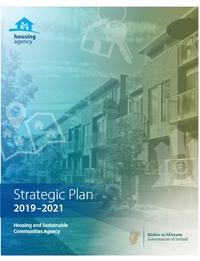
The Housing Agency Strategic Plan is available for download here.

The Housing Agency Strategic Plan is available for download here.
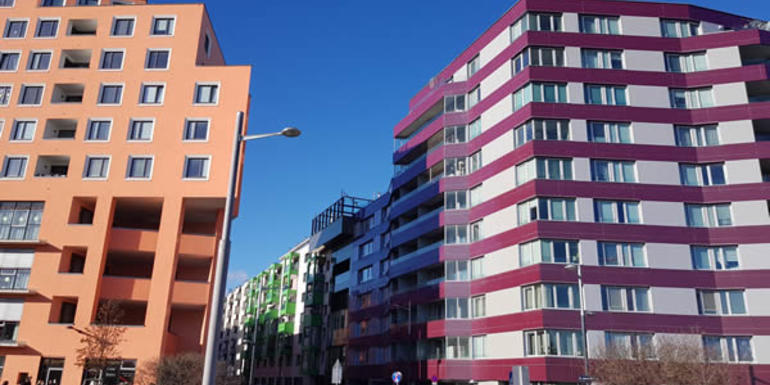
Pioneering Vienna Model of public housing exhibits across Dublin
The public exhibition will host seminars and events across three Dublin locations
Dublin, 1st April 2019 The pioneering Vienna Model of Housing will be the subject of a month long exhibition, taking place from Monday 1st to Thursday 25th April across three Dublin venues. The public exhibition is a joint partnership between the Housing Agency, Dublin City Council and the City of Vienna. It will feature a number of seminars and events to introduce a wider debate on housing futures in Dublin and nationally.
Exhibiting in CHQ in Dublin’s Docklands, The Rediscovery Centre, Ballymun, and Richmond Barracks in Inchicore, the Vienna Model of Housing is internationally regarded for its continued achievement of sustainable, high quality residential development using a cost-rental approach that in effect delivers housing for all. The model adopts a general needs approach to housing provision and delivers secure, long-term, high-quality and innovative public rental housing in well designed, adaptable and inclusive neighbourhoods.
Accompanying seminars will support discussion of integral elements of the Vienna Model such as managing population density, public housing as a sustainable solution and cost-rental.
Identified as a significant component within the Viennese Model, cost-rental works to achieve sustainable prices, disrupting the link between price and market values and moderating the boom-bust cycle. This is credited with helping to create housing at a cost that people can afford.
John O’Connor, CEO of the Housing Agency, commented, “The Housing Agency is delighted to co-sponsor the Vienna Model exhibition and the associated seminars. Our intention, when we originally thought of bringing the exhibition to Ireland, was to show what has been achieved in Vienna and to share it widely.”
John O’Connor added, “We believe the exhibition and associated events provide a timely opportunity to consider in detail a successful housing model that has contributed to making Vienna such an attractive and well-loved city for both its citizens and for visitors. As we face the considerable challenge of providing affordable housing, for many of our own citizens, there is much to learn from our European counterparts and from Vienna, in particular. ”
Discussing the success of the Vienna Model of Housing, Executive City Councillor for Women’s Issues & Housing, City of Vienna, Kathrin Gaál, said, “Providing affordable housing in Vienna has been a political priority since 1919. Compared to other cities, rents and land prices in Vienna have not solely been determined by the market. Vienna's allocation guidelines ensure that higher income earners and the middle class can access the public housing sector.”
The Vienna Model of Housing Exhibition is open to the public and will be hosted in CHQ in Dublin’s Docklands from 1st to 7th April, The Rediscovery Centre in Ballymun from 10th to 13th April and Richmond Barracks from 15th to 25th April. Free seminars and free children’s workshops will take place across all venues. Register for seminars and workshops online at www.costrentalhomes.ie
For more information: www.costrentalhomes.ie

Housing is a growing career sector in Ireland comprising of a wide range of professionals from diverse backgrounds all working towards the aim of delivering sustainable and affordable housing for everyone.
This event is for anyone who is curious about a career in housing, or who possibly has already embarked on one, and would like to learn more
It is a free event from 4 to 6:30 p.m. in the National Museum on Kildare Street on Thursday 16th May.
To book a place please email training@housingagency.ie
The evening will provide
Brought to you by the Housing Training Network made up of Institute of Public Administration (IPA) Chartered Institute of Housing Ireland (CIH) the Irish Council for Social Housing (ICSH) the Residential Tenancies Board (RTB) and the Housing Agency
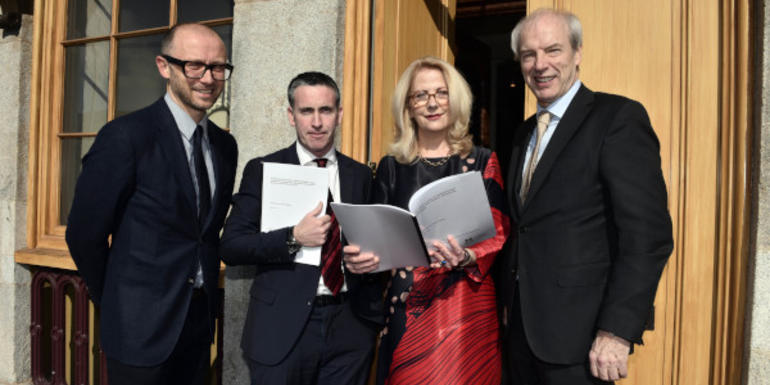
Damien English TD, Minister of State for Housing and Urban Development launched two reports authored by Dr. Philip Crowe on 27th March in the newly restored Dublin Civic Trust project in 18 Ormond Quay, Dublin 7
The reports were divided into two areas.
How data on vacancy is created and used:
Case studies from Scotland, Denmark and Philadelphia.
and
The reports demonstrate the pivotal role that Government at central and local level must play in ensuring that we have a comprehensive and easily accessible knowledge of our existing building stock and the vital role Government must play in co-ordinating and managing the creation of sustainable communities.
These reports further add to and complement the existing data available around vacancy levels, how such data is collated and measured, with a view to developing innovative solutions and initiatives to make the greatest use of our housing stock. The first report focuses on the creation and use of a reliable database on vacancy, and the second report concentrates on the incentivisation of the reuse of vacant buildings in town centres for housing and sustainable communities.
Multiple-case studies are presented that illustrate how other countries address these gaps.
Report 1:
Case studies in Scotland, Denmark and the US are presented, providing a range of different approaches. The resulting datasets on vacancy are considered critical for effective planning, policy-making and working towards a more efficient use of the limited resource of space.
Report 2:
Case studies of national programmes in Scotland, Denmark and France are presented for a range of scales and contexts. All the programmes are collaborative and recognise social, environmental and economic benefits from social cohesion at the scale of the nation (France) to the well-being of the citizen (Scotland).
Minister of State English noted that; “Pillar 5 of Rebuilding Ireland sets out a range of measures to assist in meeting Ireland’s housing needs by ensuring that Ireland’s existing housing stock is used to the greatest extent possible. My Department and local authorities have already been proactive in dealing with vacant properties and there are a number of schemes available to incentivise reactivating suitable dwellings into the liveable housing stock. We are starting to see more activity under both the Repair & Lease and Buy & Renew schemes and Local Authorities continue to exercise their powers, where appropriate, under CPO legislation.”
Continuing, the Minister welcomed both reports; “To enable the optimum number of potentially vacant dwellings be identified, it is of course, imperative that we establish a robust and accurate set of source data. The launch of these two informative documents build on the repository of data that is available to assist all stakeholders identify the greatest number of vacant properties that can be re-introduced. It sets out workable models for ensuring that sustainable vibrant communities are achievable throughout the Country.”
The research was commissioned by the Collaborative Working Group for Housing and Sustainable Living, which includes representatives from The Heritage Council of Ireland, the Housing Agency, Mayo County Council and Space Engagers.
This ongoing collaboration recognises the urgent need to address the nationwide housing crisis, to use existing buildings efficiently, and to revitalise rural towns and villages and realise their potential for creating sustainable communities.
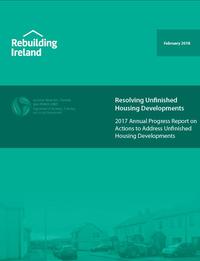
Publication of the 2017 Annual Progress Report on Actions to Address Unfinished Housing Developments
“Number of ‘ghost’ estates further reduced by 91% since 2010”
Minister for Housing and Urban Development Damien English TD, today (7 March, 2018) published the sixth annual progress report and seventh housing survey on tackling the issue of unfinished housing developments.
This reveals a “91% reduction in the unfinished developments since 2010 from almost 3,000 to 256. 2017 saw the resolution of 165 developments”.
Minister English was speaking at the launch of the report that includes the results from the 2017 National Housing Development Survey which tracks progress on unfinished housing developments since 2010. Among the key findings of this year’s survey are:
Minister English indicated that his objective is to resolve all remaining unfinished housing developments especially those within high market demand locations and strive for 100% turnaround.
The Minister acknowledges the results of the 2017 survey which indicate that the parts of developments that are occupied are, in the vast amount of cases, now well established and finished to a good standard. Minister English added “in the last twelve months we have resolved 165 developments and intend to build on that success with a further push in 2018 to resolve as many as possible of the remaining unfinished developments.”
Local authorities and on-the-ground teams have excellent local knowledge and have signalled that a number of sites with ‘unfinished’ elements are now coming back in for new planning permission. In a number of cases this was at pre-planning stage and throughout 2018 should move on to the determination of planning applications clearing the way for development subject to developer capacity, funding and demand.
Unfinished Housing Development teams established in local authorities to address the ‘unfinished’ issue have gained enormous experience and knowledge in matters of successful resolution from enforcement through to bonds and effective collaboration with receivers and financial institutions. This knowledge and expanded capabilities can also now be applied towards matters of Taking in Charge and Vacant Homes Action Plans with the need for Empty Homes Officers.
In conclusion, the Minister signalled that “in the last twelve months we have resolved 165 developments and intend to build on that success with a further push in 2018 to resolve as many as possible of the remaining unfinished developments. I am very pleased with the progress made by my Department and look forward to working with Department officials and local authorities in reducing the number of unfinished developments further throughout 2018.”
The Summary Report is available here; http://www.housing.gov.ie/sites/default/files/publications/files/unfinished_housing_developments_-_2017_annual_progress_report_0.pdf
Progress Report on UFHDs 2017, PDF 4MB
2017 UFDS Database, Excel file 555KB
Summary Data for each Local Authority for Remaining Developments, PDF 234KB
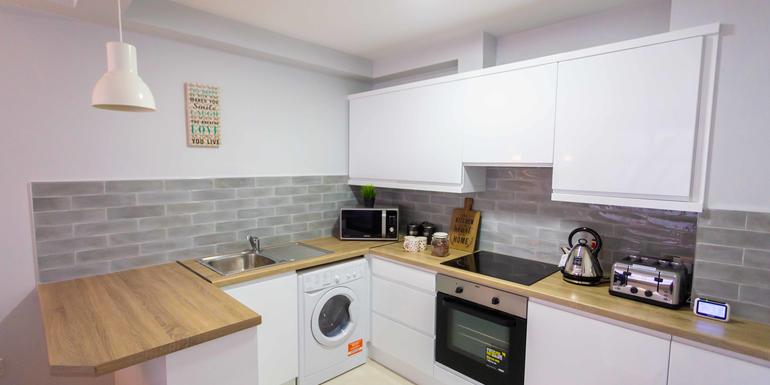
Castle Court apartments in Dublin’s city centre was officially opened today (December 4th 2018) by Minister Damien English, TD, Minister of State at the Department of Housing, Planning and Local Government.
The Housing Agency purchased the apartments using a €70m revolving fund established under Rebuilding Ireland, the Government’s action plan for housing and homelessness. Following refurbishment, the Housing Agency transferred the properties to Peter McVerry Trust. The Trust expect that all the new residents will be in their homes before Christmas.
Castle Court is located close to Christ Church in the heart of the city. This development is a modern 4 storey apartment building built in the 1990’s. It contains 13 homes comprising of 7 one-bed apartments and 6 two-bed apartments.
Speaking about the project John O’Connor, CEO of the Housing Agency said: ‘It is a good day when people, who have been in temporary accommodation, finally get the keys to a new home. We are delighted to assist Peter McVerry Trust, and other housing bodies, in the delivery of much needed homes’.

DOWNLOAD THE FULL PRESENTATION HERE
See below the order of presentations on the day.
Topic 1. GOOD FUNDING MECHANISMS FOR ACHIEVING AFFORDABLE HOUSING
Dr Gerard van Bortel, Assistant Professor Housing Management, Delft University of Technology, Netherlands
The role of the Council of Europe Development Bank
Dr Luigi Cuna and Mr Samir Kulenovic, Council of Europe Development Bank
Funding the right balance: Affordable rental and homeownership
Ms Kath Scanlon, Researcher, London School of Economics
Irish Respondent and Group Discussion
Professor Michelle Norris, Head of School, UCD
Topic 2. FINDING THE RIGHT BALANCE BETWEEN AFFORDABLE RENTAL AND AFFORDABLE HOMEOWNERSHIP
The role of the United Nations Economic Commission for Europe
Dr Gulnara Roll, Head of Housing and Land Management Unit, UNEC for Europe
Irish Respondent and Group Discussion
Mr Aidan Culhane, Director of Housing, Urbeo Residential
Topic 3. THE IRISH MODEL OF COST RENTAL AND GERMAN AFFORDABLE HOUSING POLICIES AND CHALLENGES
The Irish model of cost rental being introduced
Mr Barry Quinlan, Principal Officer, Department of Housing, Planning and Local Government
German affordable housing policies and challenges
Dr Steffen Wetzstein, Senior Researcher, Brandt School of Public Policy, Germany and
Mr Rolf Müller, Head of Housing and Property, Federal Institute for Research on Building, Urban Affairs and Spatial Development
Topic 4. HOW CAN RESEARCH BE USED TO INFORM AFFORDABLE HOUSING POLICIES?
Dr Jaana Nevalainen, Ministerial Advisor, Ministry of the Environment of Finland
Research evidence on housing affordability in Ireland
Mr Conor O’Toole, Senior Researcher, Economic and Social Research Institute
Irish Respondent and Group Discussion
Mr David Silke, Director of Research and Corporate Affairs, Housing Agency
Speaking about the seminar, John O’Connor, CEO, of the Housing Agency said ‘The Housing Agency is a centre of excellence in research to inform policy development. We realise the importance of learning lessons from Europe and sharing these with practitioners and policy makers in Ireland. We are delighted to welcome some of the top names in current European research to our event today’.
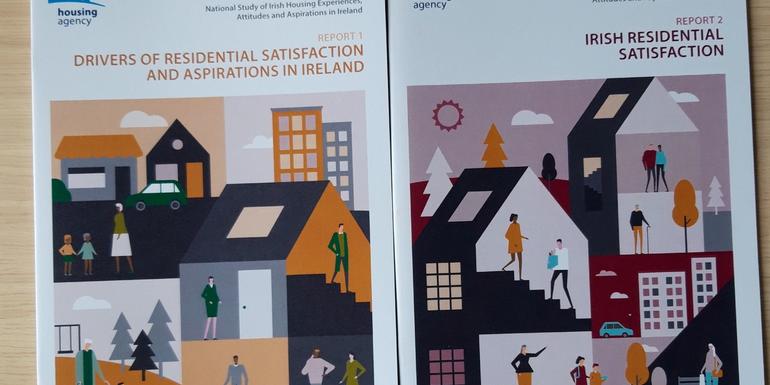
The reports by the Housing Agency and Amárach Research are divided into two separate reports.
Report 1 - Drivers of Residential Satisfaction and Aspirations in Ireland
Report 2 - Irish Residential Satisfaction
The main concern emerging from the data analysed is the issue of affordability and the high number of people, especially renters, experiencing difficulties meeting their monthly housing costs. Two-third of renters and one-third of those repaying a mortgage said they experienced difficult making payments each month. Other findings from the survey were as follows:
Satisfaction with your home plays a central role in happiness over the course of people’s lives. For greater accuracy in the survey factors taken into account included the house itself, the neighbourhood and whether the house suited the stage of life each respondent was at.
Speaking about the research David Silke, Director of Research said, “Every day we hear stories about housing issues. Stories about the supply of housing, the affordability of housing, the availability of land or long commutes. But we rarely stop to ask people what they think about their own housing situation, so we wanted to measure satisfaction levels across Ireland.
While satisfaction levels are mainly high, one significant concern coming from this research is affordability, especially for renters, and we need to continue to work to address this”.
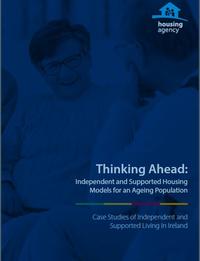
This report details 19 case studies of housing for older people across Ireland with varying scales of support services. It showcases best practice examples of housing projects developed / being developed. The report includes lessons learned from schemes developed and managed by local authorities, housing associations and by the private sector.